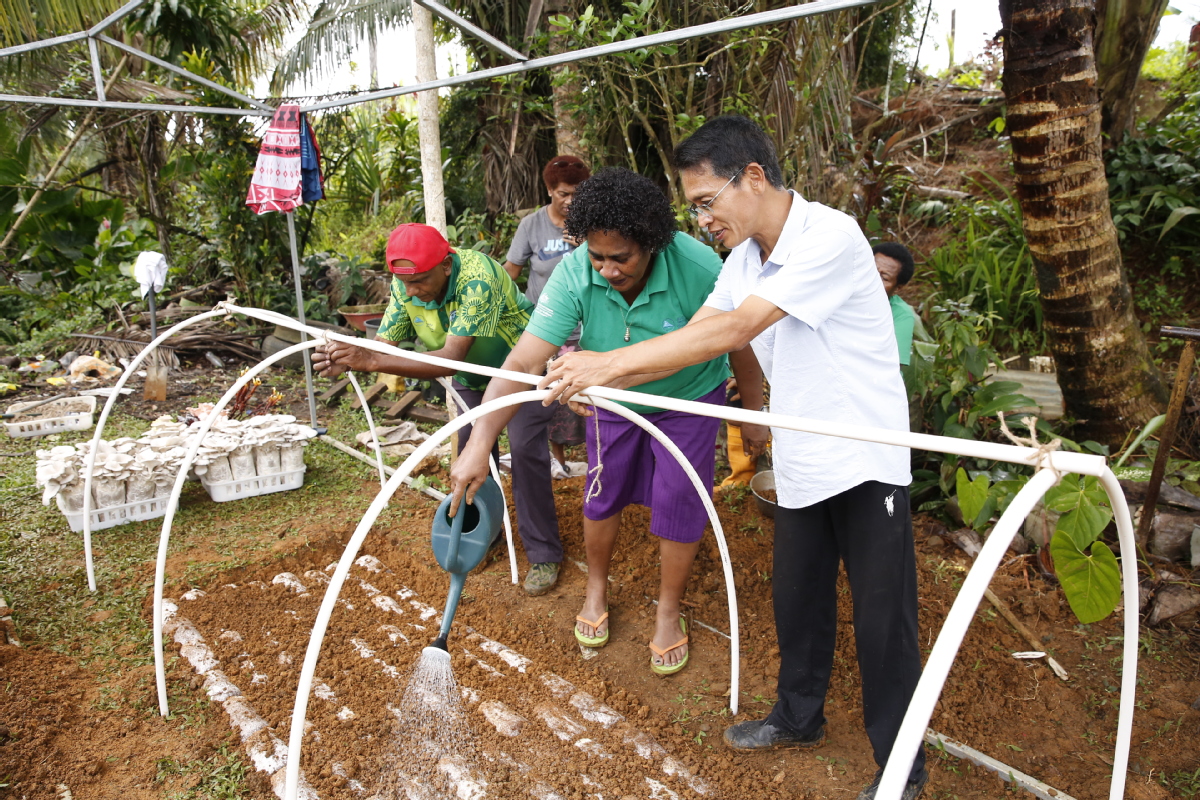China's Juncao technology empowers Fijian woman
Biz owner praises project for changing lives of many people in her country


SUVA — From a farmer to the owner of a Juncao (mushroom grass) farm and the chairwoman of the Fiji Mushroom Farmers Association, Seruwaia Waiti Kabukabu feels so proud to be able to contribute to her community and empower female compatriots.
"Due to the use of Juncao technology, I have undergone many changes and fully developed myself. More importantly, I've embraced the concept of sustainable development, which allows us to gain more than just money, but a mindset advancement," said Kabukabu, who shared with Xinhua her story of how she came across Juncao and built her career successfully with this China-aided Juncao technical project.
Encountering technology
Kabukabu was a member of the Naitasiri Women in Dairy Group and in 2019 she led 12 women to participate in a training course on Juncao technology held by the China-Fiji Juncao Technology Demonstration Center based in Nadi.
"For us, Juncao is a novel technology and an unknown area. We never thought this encounter would provide so many new opportunities for me and the women's group. It has changed the lives and careers of both myself and the other women, and made our dreams come true," she said.
After the training, they received complimentary mushroom substrate bags from the center. Under the guidance of the Chinese experts, they began to harvest and sell mushrooms within 7-10 days, earning money for their family.
"Mushroom farming is simple and easy to learn. But with fast and good results, women are still very much surprised," Kabukabu said.
The 48-year-old woman recalled that she earned 2,500 Fijian dollars ($1,142) from the first batch of mushroom substrates and bought appliances, mats, a cooking pot, food, and clothes for her family.
The increasing income also led Kabukabu to pay 1,600 Fijian dollars for a dairy training course, which is mostly dominated by men, she said, "As a woman, I'm proud to be able to pay the fees and graduate successfully."
Contributing to community
At present, Kabukabu is engaged in a community project that she has always been eager to be part of.
Access to clean water has always been a major challenge for her community for the past 20 years. Therefore, she used the mushroom income to purchase pipelines and materials for building a dam. Now clean water has been connected to the roadside, which is a big step forward for her community.
The sudden outbreak of COVID-19 disrupted the normal work and lives of many people, but this did not affect Kabukabu's enthusiasm to grow mushrooms.
Even during the pandemic, to meet the needs of local people, the Juncao center still insisted on delivering mushroom bags to farmers, she told Xinhua.
Kabukabu also mobilized some other women who lost their source of livelihood due to the pandemic to participate in the Juncao project.
At the end of 2023, Kabukabu became chairwoman of the Fiji Mushroom Farmers Association, which brought together mushroom growers from across the country to help fully explore the mushroom market.
She often organizes members to promote Juncao technology to the community of different districts, introducing the nutritional and medicinal value of mushrooms, and calling for a healthy diet.
Now they have many loyal customers, including supermarkets, universities and international organizations in Fiji. The price of orders ranges from 15 to 20 Fijian dollars per kilogram.
Promoting Juncao R&D
Besides mushroom farming, Kabukabu's women's group also plants giant Juncao grass as feed for cows.
Giant Juncao grass grows fast and has a high yield with high crude protein, which will reduce the cost of feed and solve the problem of feed shortage in the dry season, said Lin Xingsheng, team leader of the China-Fiji Juncao Technology Demonstration Center.
In addition, the application of Juncao technology can effectively control riparian landslides and soil erosion, and improve coastal saline-alkali land in Fiji, Lin added.
"The women's group is passionate about and willing to continue applying this Juncao technology because it has many striking features such as low cost, quick returns, high profits, high eco-efficiency and wide adaptability," Kabukabu said.
The China-Fiji Juncao project has been benefiting Fiji since 2014. The project has increased local productivity, provided a diverse range of quality food, ensured food security, created job opportunities, empowered women and youth, and brought solutions to climate change and sustainable development to island countries.
"The group members and I are witnesses and beneficiaries of Juncao technology," Kabukabu said.
Xinhua
- China helps Africa on its modernization journey
- TV series highlights agricultural tech
- Xi encourages African scholars to bolster China-Africa cooperation, Global South development
- Xiplomacy: How Chinese hybrid grass technology is changing the world for the better
- African farmer reaps benefits of China's Juncao tech




































